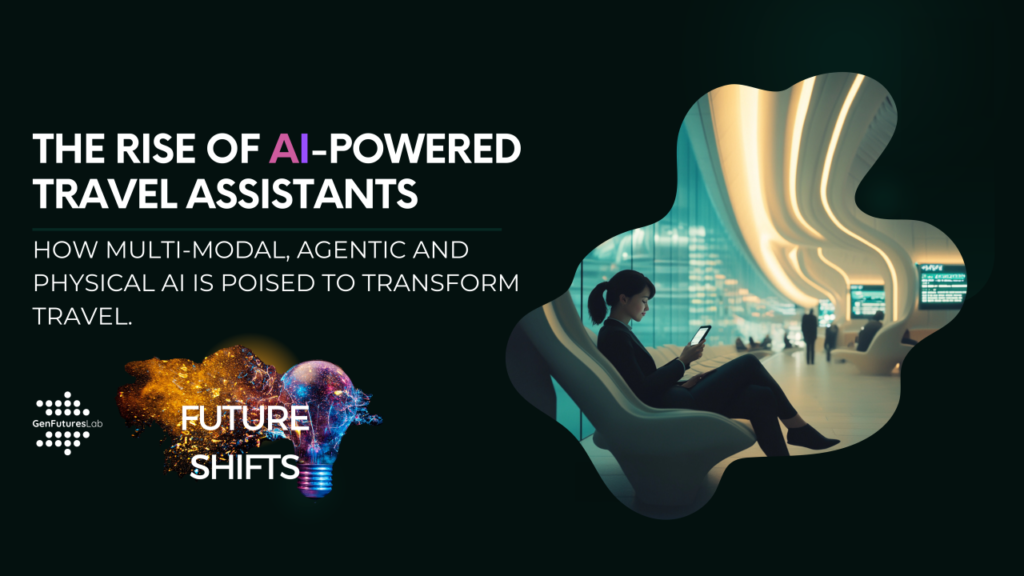AI-powered travel assistants are transforming the industry, moving beyond simple chatbots to become multi-modal, agentic, and physically integrated into travel experiences. From hyper-personalised trip planning to autonomous booking and seamless transport coordination, AI is redefining how we travel.
Beyond Chatbots: The Multi-Modal Travel Experience
Next-generation AI assistants are multi-modal, capable of processing text, voice, images, and interactions. Amazon’s Alexa+ exemplifies this, planning entire travel itineraries, booking rideshares, and coordinating hotel stays (read more here). AI-powered hotel room assistants now integrate with IoT (Internet of Things) devices, allowing guests to adjust room settings via voice commands or facial recognition.
Sesame’s new Conversational Speech Model (CSM), recently showcased in AI demonstrations, advances this further with hyper-realistic voice interactions, making AI conversations feel more human (read more here). This has the potential to enhance guest satisfaction and operational efficiency.
Who is Already Using AI Travel Assistants?
Major travel companies are integrating AI:
- Delta Airlines launched “Delta Concierge,” an AI assistant for real-time updates, personalised recommendations, and proactive disruption management.
- United Airlines employs AI-driven chatbots for weather updates, flight tracking, and rebooking.
- Airports, including London Heathrow, Atlanta’s Hartsfield-Jackson, and Frankfurt, have deployed biometric identification systems for seamless check-ins.
- Amadeus AI Solutions use machine learning to power predictive analytics for airlines and hotels, optimising revenue management and providing travellers with smarter recommendations.

Physical AI: From Smart Assistants to Robot Hospitality
Physical AI is advancing in travel:
- Henn-na Hotel in Japan features AI-powered receptionists handling check-ins and guest enquiries (read more here).
- Carnival Cruise Line has equipped several of its ships with thousands of sensors and interactive digital portals, seamlessly integrated with guest smartphones and compact wearables (Ocean Medallion). This technology automates cabin access, provides personalised activity recommendations and more (read more here).
- AI-driven baggage handling and security screening are being trialled to optimise airport operations, with some airlines eliminating boarding passes using biometric technology.
- Hilton’s Connie, an AI-powered concierge, offers local insights and learns from guest interactions.

Key Trends and Future Outlook
AI is rapidly evolving in the travel industry, driven by advancements in multi-modal capabilities, agentic decision-making, and physical AI integration. The introduction of real-time AI assistants, human-like voice interactions, and predictive automation is already streamlining travel logistics and personalisation. As AI models continue to improve, become faster and more cost efficient as well as automation reaches the next level with tools such a OpenAI’s Operator, we can expect a shift toward even more intelligent and proactive travel solutions.
Looking ahead, AI will enable fully automated travel assistants capable of managing entire journeys – from booking flights and accommodations to dynamically adjusting itineraries in response to real-time disruptions. The rise of hyper-personalised travel experiences, powered by AI-driven insights, will transform customer service, loyalty programs, and operational efficiency across airlines, hotels, and travel management firms.
As AI becomes more embedded in travel ecosystems, businesses that embrace this transformation will gain a competitive edge, offering seamless, intuitive, and highly responsive experiences for travellers worldwide.
Webinars Alert!
Don’t miss our upcoming live webinars:
Using AI at Scale to Automate Global Content – Date: 12th March⏰ Time: 12:00–13:00 UK / 13:00–14:00 CET📍 Live on LinkedIn

The Evolving Fan – How Technology is Changing the Game – Date: 19th March⏰ Time: 12:30–13:30 UK / 13:30–14:30 CET📍 Live on LinkedIn
Join Me at Culture on Tap
I will be part of an expert panel discussing the future of AI, particularly its impact on people and culture. Details below. 👇



